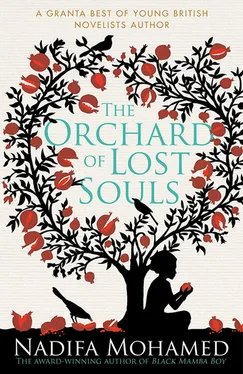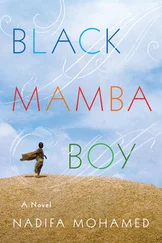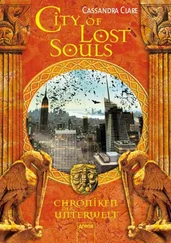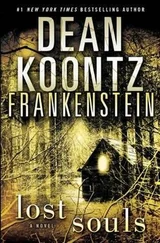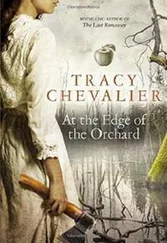Milgo comes running towards her, her hand held up ready to smack.
Deqo continues to dance, but her eyes are fixed on Milgo’s enraged face. Other women come behind her, just as angry. A thin, dark stream of urine trickles onto her feet.
Grabbing Deqo’s arm, Milgo drags her away so fast that when she opens her eyes she is in the dark recess between two stands.
The blows come as soon as she is out of sight of the crowd, hands and feet attacking from all sides and words stinging her ears. Milgo shouts one insult after the other, the music still blaring loudly behind them.
At the heart of the swirling mass of dancers Kawsar notices a still point, an emptiness that seems to reflect how she feels. Within the circle is a forlorn girl in red staring at her feet, unconscious of where she is. The sight touches Kawsar, a moment of truth within this fiction. The serene moment lasts a second before the Guddi descend on her and Kawsar watches as the little girl is pulled away by the arm, four or five women crowding around her; she can tell by their expressions what they are going to do and rises before they take her away. Kawsar feels something has broken loose inside her, something that has been dammed up — love, rage, a sense of justice even; she doesn’t know what, but it heats her blood.
‘Where are you going?’ demands Dahabo.
‘I’ll be back, stay here.’
‘Kawsar, wait!’
But she is gone, pushing past the women in the aisle, stepping on their toes and clambering over them when they don’t move quickly enough. A couple of steps down and she is free of the crush.
‘Whore. . imbecile. . bitch,’ shout the Guddi beside the stand, and there she is — an anguished face pleading for mercy.
‘Give her to me,’ Kawsar says with more calm than she feels.
‘Go back to your own business,’ replies a young turbaned woman dismissively.
‘This is my business. I said give her to me.’ Kawsar charges forward and reaches for the girl.
The young woman holds Kawsar back. ‘You want us to call security, you old fool? You want to be thrown in jail?’ she shouts.
‘Do what you like, you can’t hurt me. I am from this town, I was born here, I won’t be told what to do by you.’ Her voice is shrill as she lunges yet again for the girl.
The Guddi block her and form a semi-circle around the child. ‘Milgo, go and call security, this mad woman wants trouble,’ the young woman says, and a gaunt older woman runs back to the entrance.
The little girl breaks free from her captors and runs away at full pelt.
‘Naayaa! Naayaa! Don’t worry, I will catch her.’ The youngest girl in the group follows in pursuit.
Their attention returns to Kawsar. ‘You want a night in jail to show you how things are? Old women have hard heads and learn too late sometimes.’ The group’s leader presses her finger into Kawsar’s forehead for emphasis.
Kawsar brushes her hand away. They stand inches apart as if in a duel.
A petite female soldier wearing a beret approaches with two male soldiers on her heels. She looks disgusted by the whole scene and gestures impatiently for Kawsar to follow her. The Guddi make space and Kawsar departs with her head held high.
‘Kawsar! Where are they taking you?’ Dahabo asks, leaning over the edge of the stand, Maryam beside her.
‘Jail,’ replies the soldier, ‘and we’ll take you too if you don’t return to your seat.’
‘Go back, I will see you later.’ Kawsar is strangely jubilant; she is the one making things happen now.
Deqo carries on blindly into the strange city. Looking behind, she sees her pursuer still running clumsily after her. She accelerates, taking wide, elegant strides. In Saba’ad she had never been able to run freely between the crowded buuls, the women’s legs outstretched in the small spaces between them; it was an environment that enforced slowness, wariness rather than childish abandon. She imagines now that there had been hands grabbing at her skirt and pulling her back, down into the earth that sucked people in every day. Here there is space, endless space, wide roads and boundless buildings.
She pumps her legs and arms, her lungs heaving, her heart pounding, testing her body to the edge of its capacity. She feels faster than the cars on the road, the crows in the sky, the bullets in the soldier’s rifles. She races against herself until the stadium is far behind her; the thud of her feet hitting the dust matches the beating of her heart. She is a slick machine in complete possession of itself. She reaches a bridge and crosses the vibrating concrete. Past the two-storeyed Oriental Hotel with Land Rovers pulled up near its entrance and the glass-fronted pharmacy, the mechanic’s shop with black tyres piled up outside, the scrap metal merchant’s corrugated tin shack. The streets are empty of people, little piles of dust and leaves gathered in corners every few metres as if sweepers have just been there; a single bus passes her as she speeds towards the market.
The old woman is quiet in the back of the van, her nose in the air as if she’s in a taxi; haughtiness is all she has to hide behind now but it won’t work. She will have to spend a night on the floor like all the other miscreants, use a bucket to relieve herself and wait until she is told she can leave. This isn’t the oldest troublemaker Filsan has had to deal with — the market woman who pelted General Haaruun’s motorcade had to have been over eighty — but this one looks wealthier, well-bred.
They pull up beside the central police station. Filsan hasn’t bothered to handcuff her — what’s the point? She can hardly outrun anyone. The old woman pulls her headscarf around her cheeks but Filsan yanks it back to reveal her face. It is only then that their eyes meet, the old woman’s full of reproach and contempt. Filsan grabs her arm and leads her into the police station; she will report her behaviour in the stadium to police officers and then leave them to take care of her.
‘The cells are full,’ the policewoman at the desk barks, not even looking up from the paper in her hand.
‘She has caused a public nuisance during the celebration.’
The policewoman raises her head and looks at the suspect. ‘What did she do?’
‘Harassed and threatened women from the Guddi .’
The policewoman laughs and bends over the tiny public nuisance. ‘Are you not too old for this? Are you not ashamed of yourself?’ She is maybe twenty years old with streaks of bleached blonde hair peeking out from under her cap. ‘Where do you live?’
‘Guryo Samo.’
‘Name?’
‘Kawsar Ilmi Bootaan.’
She jots her details into a form and then shoves the pen behind her ear. ‘She won’t take up too much space, I guess.’ The policewoman sighs. ‘Hand her over.’
Filsan watches as Kawsar is escorted to a group cell. She walks slowly but shows no emotion; she moves like a tourist on a tour of the place, looking left and right as if to say, ‘Yes, yes, everything is as it should be.’ The barred doors click behind her and then she is gone, swallowed up in the guts of the police station to be digested and excreted out another day.
Saylada dadka, thinks Kawsar. This is where her journey ends, in the ‘people market’. From here the fortunate ones will be ransomed out while others end up in the hospital morgue or disappear into prisons all over the country This was the place that had broken her child. She looks around, imagining where Hodan might have sat that first night after she was arrested with her classmates. The cell is large with walls that had once been painted white but are now gangrened and blackened with mould. It is little more than a dungeon with around thirty women and girls spread across its concrete floor.
Читать дальше
